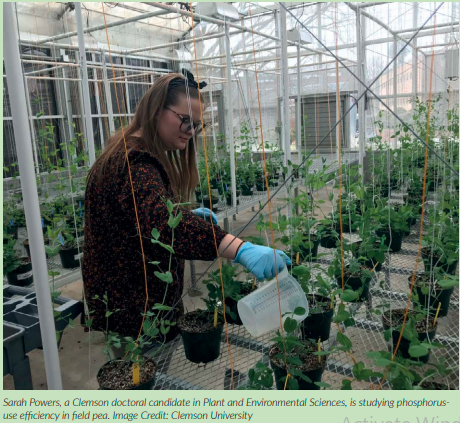Written by Denise Attaway, Clemson University, South Carolina USA
Phosphorous is one of six essential nutrients for plants and a Clemson University doctoral candidate wants to show farmers how organically growing cereal and pulse crops can improve nutrition while lowering production costs.
Sarah Powers is a doctoral candidate in the Clemson Plant and Environmental Sciences Department. Her research focuses on understanding phosphorususe efficiency in field pea. To help fund her studies, Powers has received a Columbus Hamond Townsend Student Assistant Endowment for the second consecutive year.
“I want to determine if it is possible to select cultivars that can sustain growth and yield under phosphoruslimited conditions,” said Powers.
According to the United States Department of Agriculture (USDA), organic farming is a production system that incorporates practices, such as cover cropping and crop rotation, to improve soil quality and build organic soil matter. Phosphorous is a naturally-occurring element found in the soil. All living organisms require phosphorus. Plants use phosphorous for photosynthesis, storage and transfer of energy, and respiration among various other functions. While phosphorus is very important to agriculture, it is a non-renewable resource and cannot be naturally replaced quickly enough to keep up with consumption.
“This can be particularly limiting for organic growers,” Powers said. “Phosphorous-use efficiency will become a greater concern as phosphorous fertilizers become more expensive and difficult to obtain.”
Organic agriculture could benefit from phosphorous-use efficient field pea cultivars by increasing yields and soil nutrition. Greater yields of field pea could benefit health food markets as these peas are highly nutritious and have superior protein quality, Powers said.

Powers’ research is part of a study that involves developing pulse and cereal grain crops that can be grown organically in South Carolina. The study is funded by a nearly $1 million grant from the USDA and is led by Clemson professors Dil Thavarajah, Rick Boyles, and Stephen Kresovich. The USDA is using cooperative research on pulse crops, such as dry beans, dry peas, lentils, and chickpeas; to provide solutions to the critical health and sustainability challenges facing people living in the United States and across the globe.
“Current organic grain production depends on cultivars that have been bred for non-organic production, but these often are not suitable for organic production,” Thavarajah said. “We need varieties that can be organically grown.”
By using organic farming practices, farmers don’t need to buy expensive chemicals and fertilizers. Instead, they use farming practices, such as different tillage methods and cover-cropping for weed control, and biological methods for insect pest control. Organic farming is sometimes equated with lower yields and nutritional quality.
“This research will allow for the breeding of future biofortified field pea cultivars with increased economic returns,” Powers said. “These traits will make field peas more desirable and popular in the organic market, as well as better able to resolve micronutrient deficiencies.”